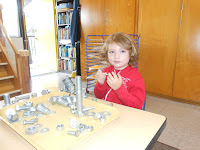When I started
teaching preschool way back in 1979 the trend was for everything natural,
everything real. Like wooden structures
on the play yards, real pots and pans, telephones and such in the dramatic play
areas. Then, it slowly moved to brightly
colored plastic play equipment which was more durable and was easier to
maintain. The dramatic play toys became “child sized,” plastic and brightly
colored as well.
Now, we are seeing
the tide turn and the trend is going back to natural environments and real
things to pretend with while playing and learning about their world around them. And, I am happy as can be! It is only when I
look back I see the real value in using items that are “real world” for our
young children.
Not only do I
believe children enjoy real items like pots and pans, telephones, keyboards,
nuts and bolts, rocks and logs, water and dirt/sand more, they also provide a
variety of advantages. First and
foremost there is a greater respect for them and their play. Also, these items provide
a variety of textures to feel, weight which builds muscle strength and they
make sounds when clanked together. They provide wonderful opportunities for
exploration and imagination.
So, open up the kitchen cabinets and the back
doors once again and let your children have at it!



